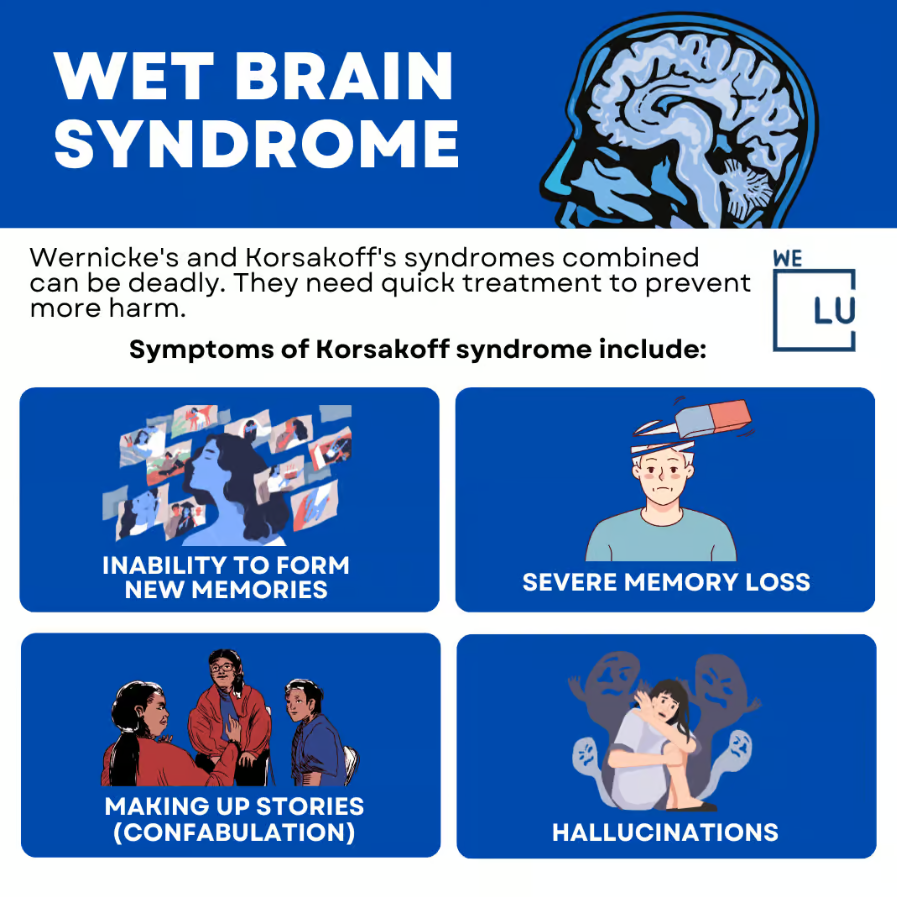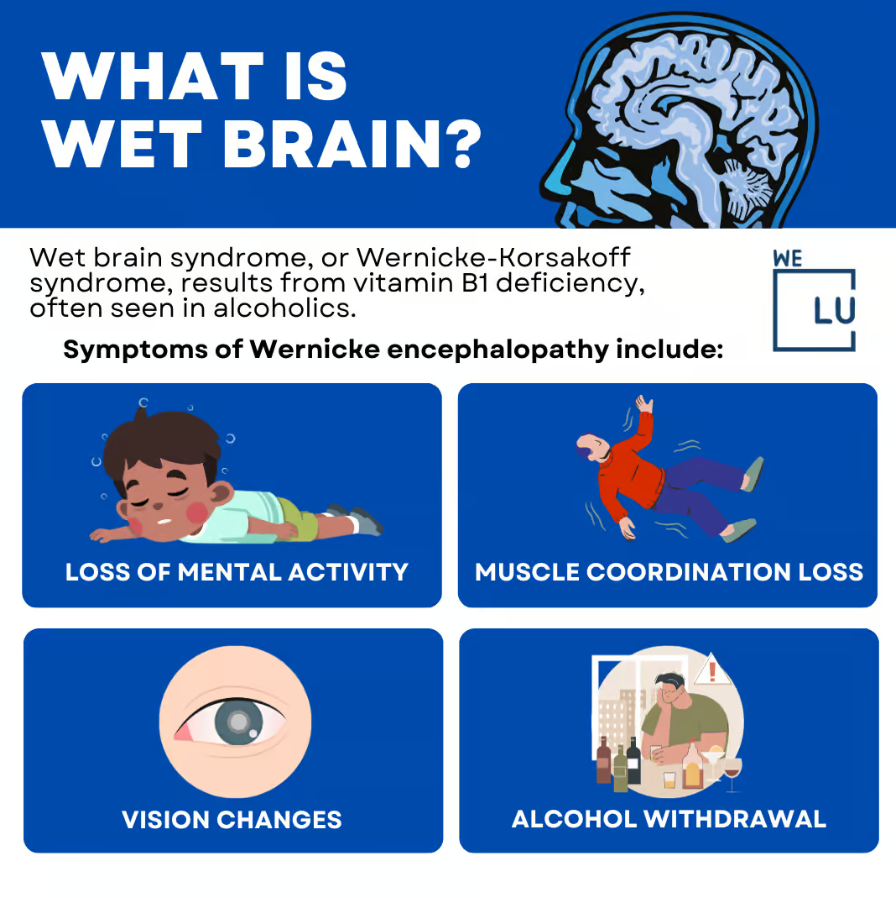Wernicke’s Encephalopathy and Korsakoff’s Psychosis
Korsakoff psychosis occurs in 80% of untreated Wernicke encephalopathy cases, a condition that is often linked to severe alcoholism.
The reason why psychosis occurs in some patients is unclear, but preventing or treating Wernicke encephalopathy may reduce the chances of Korsakoff psychosis. Also, a severe or repeated episode of alcohol withdrawal–related delirium tremens can trigger Korsakoff psychosis, even without a prior Wernicke encephalopathy episode.
Other potential triggers include:
- Head injury.
- Subarachnoid hemorrhage.
- Thalamic hemorrhage.
- Thalamic ischemic stroke.
- Tumors affecting the paramedian posterior thalamic region.
All these triggers primarily affect the brain.
If you are struggling with Korsakoff psychosis, the opportunity for healing is within your reach. Contact We Level Up Florida for compassionate support. Every call to our 24/7 hotline is free and confidential.
What is Korsakoff Syndrome?
Korsakoff’s syndrome is when people have significant memory problems, especially for recently learned things. It’s often linked to long-term alcohol use or poor nutrition.
The specific areas in the brain causing these memory issues are still debated, but they involve structures of the mammillary bodies and certain thalamic parts. Patients may also have difficulties with the frontal lobe, affecting how they retrieve older memories.
While recalling recent and older events can be challenging, making up stories (confabulation) is rare, except during the initial confused stage.
The seriousness of memory problems sometimes matches how memory was before.
Korsakoff Psychosis Symptoms
Korsakoff psychosis leads to significant memory problems, affecting both immediate and past events. Patients often rely on memories from long ago, which seem less impacted than recent memories. Confusion about the current time is a common symptom that often resembles psychotic episodes.
Emotional changes, like apathy or mild euphoria with limited responses to events, may occur, along with reduced spontaneity and initiative. Confabulation, where patients unknowingly create made-up or confused stories about events they can’t remember, is a notable early sign. These fabrications can be convincing, making it challenging to detect the underlying disorder.
The most common symptoms of Wernicke-Korsakoff psychosis are:
- Ataxia (lack of coordination and balance).
- Ophthalmoplegia (paralysis or weakness of eye muscles).
- Delirium.
- Profound anterograde amnesia (difficulty forming new memories).
- Severe retrograde amnesia (loss of memories).
- Disorientation to time.
- Emotional changes (apathy, blandness, or mild euphoria with limited responses to events).
- Decreased spontaneity and initiative.
- Confabulation (unconscious fabrication of imaginary or confused accounts of events).
Korsakoff Psychosis and Disorders of Memory
Korsakoff’s psychosis, or syndrome, is a severe memory loss condition triggered by the deficiency of thiamine (vitamin B1). Although frequently linked to chronic alcoholism, it can also manifest in situations such as a poor diet with insufficient thiamine intake.
Typically, Korsakoff psychosis develops after Wernicke’s encephalopathy, characterized by symptoms such as coordination issues (ataxia), eye muscle paralysis (ophthalmoplegia), and delirium.
Immediate treatment with high-dose thiamine can prevent Korsakoff’s psychosis when Wernicke’s encephalopathy is detected. Unfortunately, if amnesia occurs without delirium, indicating that Korsakoff’s psychosis has already set in, the chances of recovery are scarce.
Korsakoff’s psychosis leads to profound anterograde amnesia (difficulty forming new memories) and severe retrograde amnesia (loss of memories). The condition is associated with damage to specific brain regions, including the mamillary body, mediodorsal nucleus, and anterior thalamic nucleus. Addressing thiamine deficiency is crucial in cases of acute or subacute amnesia, emphasizing the importance of early intervention in memory disorders.


Skip To:
Learn More:
- The Danger of Alcohol-Induced Psychosis
- 5 Stages of Psychosis, Types, Signs, and Effective Treatment
- What is Bipolar Psychosis? Learn More About Bipolar with Psychosis Symptoms, Cause, and Treatment. How Long Does Bipolar Psychosis Last?
- What is Postpartum Psychosis? Symptoms, Risks, and Treatment
- Manic Depression Meaning, Symptoms, and Effective Treatment
- Psychosis Test Free and Online Confidential Results
- Hallucinogen Persisting Perception Disorder Symptoms, Causes, and Treatment
- Persecutory Delusions Examples, Symptoms, and Treatment. Persecutory Delusional Disorder.
- Bipolar Schizophrenia Differences. Bipolar Vs Schizophrenia. Schizophrenia Vs Bipolar Symptoms. Bipolar and Schizophrenia Causes. Schizophrenia Bipolar and Schizoaffective Disorder.
- How a Person With Bipolar Thinks? Fact Vs. Fiction
Get Korsakoff psychosis treatment and counseling that works. Reach out for professional support with a free call to our 24/7 mental health hotline.
Get Help. Get Better. Get Your Life Back.
Searching for Accredited Dual Diagnosis Mental Health Centers Near You?
Even if therapy failed previously, or are in the middle of a difficult crisis, we stand ready to support you. Our trusted behavioral health specialists will not give up on you. When you feel ready or just want someone to speak to about counseling alternatives to change your life call us. Even if we cannot assist you, we will lead you to wherever you can get support. There is no obligation. Call our hotline today.
FREE 24/7 Dual Diagnosis Mental Health Services HotlineWernicke Korsakoff Psychosis Diagnosis
Korsakoff psychosis is typically diagnosed based on distinctive symptoms in individuals with a history of heavy, long-term alcohol use. Doctors confirm the diagnosis using several clinical tests by ruling out other potential causes, such as brain injuries or infections.
Korsakoff Psychosis Alcoholism Problem
Those with a long history of heavy alcohol use may show symptoms like severe memory loss and confusion. Diagnosis includes:
- Identifying alcohol use disorder signs and ruling out other causes.
- Highlighting the need for early intervention.
- Addressing alcohol dependence to manage this complex neurological condition effectively.
We Level Up Florida Korsakoff Psychosis Treatment Center
Committed to evidence-based programs, our dedicated team ensures the highest standards of care, tailoring personalized programs to meet the unique needs of each individual on their journey to healing.
We Level Up Florida mental health treatment center offers comprehensive Korsakoff psychosis inpatient treatment. Our empathetic team is devoted to providing personalized care, employing innovative methods to support individuals in overcoming the challenges of Korsakoff psychosis.
Immerse yourself in a nurturing environment with tailored treatment plans.
Start your journey to healing by reaching out to We Level Up Florida Mental Health Treatment Center. Call us for a free and confidential assessment.


End the Emotional Pain. Get Your Life Back.
Feeling Depressed, Anxious or Struggling with Mental Health Illness? Get Safe Comfortable Mental Health Dual Diagnosis High-Quality Therapy From Counselors That Care. Begin Your Recovery Now.
Hotline (855) 940-6125Korsakoff Psychosis Treatment
Effectively managing Korsakoff psychosis demands a thorough strategy centered on inpatient treatment. This setting, complemented by a diverse care team, addresses the complex challenges tied to severe memory deficits.
- Inpatient Rehabilitation Programs: Inpatient psychosis treatment provides a structured and immersive environment for individuals. These programs typically involve round-the-clock care in a specialized treatment center. Patients benefit from continuous medical supervision, ensuring prompt intervention for emergent issues.
- Treatment includes high-dose thiamine therapy to address the underlying deficiency. Also, individuals participate in cognitive rehabilitation and therapy sessions to manage memory deficits and associated challenges.
- Multidisciplinary Care Team: A multidisciplinary team of neurologists, psychiatrists, psychologists, and rehabilitation specialists collaborates to provide comprehensive treatment. Each team member contributes expertise to address different aspects of Korsakoff psychosis.
- Neurologists focus on medical management.
- Psychiatrists address mental health components.
- Psychologists implement cognitive rehabilitation.
- Rehabilitation specialists assist in functional recovery.
- This collaborative approach ensures a holistic and tailored treatment plan.
- Family Involvement and Support: Involving family members in the treatment process is integral for long-term success in managing Korsakoff psychosis. Family education programs help loved ones understand the condition, providing insights into effective communication and support strategies. Ongoing family support facilitates a smoother transition from inpatient care to continued care in the community.
Do you have questions about how to treat Kosakoff psychosis through a comprehensive program? Call the We Level Up helpline 24/7.
First-class Facilities & Amenities
World-class High-Quality Mental Health Services & Behavioral Health Substance Abuse Treatment
Rehab Centers TourRenowned Mental Health Centers. Serene Private Facilities. Inpatient Rehab Programs Vary.
Mental Health Helpline (855) 940-6125Proven recovery success experience, backed by a Team w/ History of:
15+
Years of Unified Experience
100s
5-Star Reviews Across Our Centers
10K
Recovery Successes
- Comprehensive Dual-Diagnosis Treatment
- Complimentary Family & Alumni Programs
- Coaching, Recovery & Development Events
- Comfortable Onsite Medical Detox Center

Overcoming Korsakoff Psychosis and Management
Overcoming Korsakoff psychosis is a multi-faceted journey that begins with seeking professional help and engaging in comprehensive treatment. Inpatient rehabilitation programs provide a structured environment for individuals to receive round-the-clock care, ensuring prompt medical intervention and high-dose thiamine therapy to address the underlying deficiency.
The involvement of a multidisciplinary care team comprising neurologists, psychiatrists, psychologists, and rehabilitation specialists contributes to a tailored and holistic treatment approach. Family plays a crucial role in this process, with education programs and active participation in therapy sessions providing essential support and understanding.
Moreover, focusing on cognitive rehabilitation helps individuals manage memory deficits and regain functional abilities.
The collaborative efforts of medical professionals and familial support create a nurturing environment that maximizes the chances of successful recovery from psychosis. With a commitment to comprehensive care, individuals can navigate the challenges of this condition, rebuild their lives, and achieve a meaningful and fulfilling future.
If you’re struggling with psychosis, don’t hesitate to reach out to the We Level Up Florida helpline for dedicated support and guidance. Each call is free and confidential.
World-class, Accredited, 5-Star Reviewed, Effective Mental Health Dual Diagnosis Programs. Complete Integrated Inpatient Rehab with Free Post Discharge Therapy Planning.
CALL (855) 940-6125End the Emotional Pain Rollercoaster. Gain Stability & Happiness Through Recovery Treatment. Start Mental Health Counseling Today. Get Free No-obligation Guidance by Behaviroal Health Specialists Who Understand Mental Health Recovery.
Psychotic Break vs Nervous Breakdown Defined, Symptoms, Causes, and Recovery | Informative Video
Experience Transformative Recovery at the We Level Up Treatment Center.
See our authentic success stories. Get inspired. Get the help you deserve.



Start a New Life
Begin with a free call to a behavioral health treatment advisor. Learn more about our dual-diagnosis programs. The We Level Up treatment center network delivers recovery programs that vary by each treatment facility. Call to learn more.
- Personalized Care
- Caring Accountable Staff
- World-class Amenities
- Licensed & Accredited
- Renowned w/ 5-Star Reviews
We’ll Call You
Search We Level Up FL Psychosis Treatment, Mental Health Topics, & Resources
Sources
- Covell T, Siddiqui W. Korsakoff Syndrome, and Korsakoff’s Psychosis Treatment. [Updated 2023 Jan 30]. In: StatPearls [Internet]. Treasure Island (FL): StatPearls Publishing; 2023 Jan-. Available from: https://www.ncbi.nlm.nih.gov/books/NBK539854/
- Akhouri S, Kuhn J, Newton EJ. Wernicke-Korsakoff Syndrome. [Updated 2023 Jun 26]. In: StatPearls [Internet]. Treasure Island (FL): StatPearls Publishing; 2023 Jan-. Available from: https://www.ncbi.nlm.nih.gov/books/NBK430729/ Learn more about Korsakoffs Psychosis and Korsakoff’s Alcoholic Psychosis
- Wernicke-Korsakoff Syndrome – National Institute of Neurological Disorders and Stroke (.gov)
- Tamminga CA, Lahti AC. Treatments for chronic psychosis. Dialogues Clin Neurosci. 2001 Dec;3(4):281-92. Doi: 10.31887/DCNS.2001.3.4/ctamminga. PMID: 22033485; PMCID: PMC3181661.
- Understanding Psychosis Treatment – National Institute of Mental Health (NIMH)
- Understanding A First Episode Of Psychosis Young Adult – Substance Abuse and Mental Health Services Administration (SAMHSA)
- Definition of Psychosis for Certain VA Purposes – Federal Register (.gov)
- First-Episode Psychosis and Co-Occurring Substance Use Disorders – Substance Abuse and Mental Health Services Administration (SAMHSA)
- National Collaborating Centre for Mental Health (UK). Psychosis Treatment with Coexisting Substance Misuse: Assessment and Management in Adults and Young People. Leicester (UK): British Psychological Society (UK); 2011. (NICE Clinical Guidelines, No. 120.) 2, PSYCHOSIS WITH COEXISTING SUBSTANCE MISUSE. Available from: https://www.ncbi.nlm.nih.gov/books/NBK109796/
- Kumar S, Soren S, Chaudhury S. Hallucinations: Etiology and clinical implications. Ind Psychiatry J. 2009 Jul;18(2):119-26. Doi: 10.4103/0972-6748.62273. PMID: 21180490; PMCID: PMC2996210.





